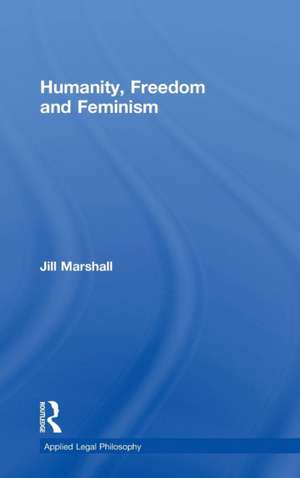Humanity, Freedom and Feminism: Applied Legal Philosophy
Autor Jill Marshallen Limba Engleză Hardback – 28 oct 2005
| Toate formatele și edițiile | Preț | Express |
|---|---|---|
| Paperback (1) | 489.26 lei 43-57 zile | |
| Taylor & Francis – 27 feb 2017 | 489.26 lei 43-57 zile | |
| Hardback (1) | 1000.27 lei 43-57 zile | |
| Taylor & Francis – 28 oct 2005 | 1000.27 lei 43-57 zile |
Din seria Applied Legal Philosophy
- 30%
 Preț: 850.99 lei
Preț: 850.99 lei - 18%
 Preț: 1001.07 lei
Preț: 1001.07 lei - 27%
 Preț: 997.69 lei
Preț: 997.69 lei - 18%
 Preț: 1059.45 lei
Preț: 1059.45 lei - 24%
 Preț: 325.01 lei
Preț: 325.01 lei - 30%
 Preț: 777.27 lei
Preț: 777.27 lei -
 Preț: 469.34 lei
Preț: 469.34 lei - 31%
 Preț: 764.20 lei
Preț: 764.20 lei -
 Preț: 489.26 lei
Preț: 489.26 lei - 25%
 Preț: 830.92 lei
Preț: 830.92 lei - 28%
 Preț: 824.70 lei
Preț: 824.70 lei -
 Preț: 469.34 lei
Preț: 469.34 lei -
 Preț: 469.34 lei
Preț: 469.34 lei - 18%
 Preț: 1058.38 lei
Preț: 1058.38 lei - 30%
 Preț: 770.33 lei
Preț: 770.33 lei - 29%
 Preț: 792.93 lei
Preț: 792.93 lei - 28%
 Preț: 823.08 lei
Preț: 823.08 lei -
 Preț: 469.34 lei
Preț: 469.34 lei - 18%
 Preț: 700.75 lei
Preț: 700.75 lei - 18%
 Preț: 1054.71 lei
Preț: 1054.71 lei - 28%
 Preț: 824.53 lei
Preț: 824.53 lei - 18%
 Preț: 1054.71 lei
Preț: 1054.71 lei - 18%
 Preț: 703.93 lei
Preț: 703.93 lei - 31%
 Preț: 764.20 lei
Preț: 764.20 lei -
 Preț: 389.66 lei
Preț: 389.66 lei -
 Preț: 489.26 lei
Preț: 489.26 lei - 18%
 Preț: 1110.92 lei
Preț: 1110.92 lei - 18%
 Preț: 1062.26 lei
Preț: 1062.26 lei - 18%
 Preț: 1003.43 lei
Preț: 1003.43 lei -
 Preț: 436.14 lei
Preț: 436.14 lei - 15%
 Preț: 443.36 lei
Preț: 443.36 lei - 18%
 Preț: 1054.71 lei
Preț: 1054.71 lei -
 Preț: 481.58 lei
Preț: 481.58 lei - 18%
 Preț: 1059.45 lei
Preț: 1059.45 lei - 15%
 Preț: 698.17 lei
Preț: 698.17 lei - 18%
 Preț: 1163.63 lei
Preț: 1163.63 lei - 18%
 Preț: 1009.21 lei
Preț: 1009.21 lei - 28%
 Preț: 821.13 lei
Preț: 821.13 lei - 18%
 Preț: 1054.71 lei
Preț: 1054.71 lei - 20%
 Preț: 249.77 lei
Preț: 249.77 lei
Preț: 1000.27 lei
Preț vechi: 1219.84 lei
-18% Nou
Puncte Express: 1500
Preț estimativ în valută:
191.46€ • 208.04$ • 160.93£
191.46€ • 208.04$ • 160.93£
Carte tipărită la comandă
Livrare economică 21 aprilie-05 mai
Preluare comenzi: 021 569.72.76
Specificații
ISBN-13: 9780754625629
ISBN-10: 0754625621
Pagini: 214
Dimensiuni: 156 x 234 x 13 mm
Greutate: 0.45 kg
Ediția:1
Editura: Taylor & Francis
Colecția Routledge
Seria Applied Legal Philosophy
Locul publicării:Oxford, United Kingdom
ISBN-10: 0754625621
Pagini: 214
Dimensiuni: 156 x 234 x 13 mm
Greutate: 0.45 kg
Ediția:1
Editura: Taylor & Francis
Colecția Routledge
Seria Applied Legal Philosophy
Locul publicării:Oxford, United Kingdom
Cuprins
Contents: Foreword, Nicola Lacey; Preface and acknowledgements; Introduction. Part I Feminist Analysis of the Human: Introduction to Part I ; Reason and humanity; Universalism and the exclusion of the feminine; The postmodern subject and feminism. Part II Free Existence: Introduction to Part II; Positive Freedom; Human Potentiality. Part III Global Applications: Introduction to Part III; Globalism and potentiality; International humanitarian law and the ICTY; Concluding hope; Bibliography; Appendices I and II; Table of Cases; Table of treaties, legislation and statutory instruments; Index.
Notă biografică
Dr Jill Marshall is a Lecturer at the Department of Law, Queen Mary University of London, UK.
Recenzii
'Jill Marshall's book is an important contribution to the revival of a sympathetic feminist engagement with liberal theory...Drawing on an impressive range of sources, Marshall puts the case for a liberal individualism which places the social construction of personhood and autonomy at its core...Marshall's cogent synthesis of existing arguments brings a fresh impetus to the important field of feminist legal and political theory. It deserves to find an appreciative audience.' Nicola Lacey, London School of Economics and Political Science, UK (from the Foreword) 'Jill Marshall begins her authoritative book with the ever intriguing question from Robin West "What is a human being?" (p. 1). She goes on to answer it through her engagement with an impressive range of sources and scholars to conclude, hopefully, that "The only way to change ideas of the possible is to think th eimpossible, dream and form ideas and mobilize those into concrete changes."...having read her compelling book and embraced her theoretical stance, I echo her hope...' Journal of Law and Society
Descriere
While some feminists seek to use ideas of the 'universal human subject' to include women, others argue that such ideas are intrinsically masculine and exclude the feminine. This book analyzes and critiques 'second wave' feminists who discuss how philosophers such as Plato and Aristotle, Descartes, Hobbes and Kant regard human beings and their capacities.











